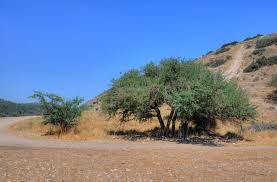Grace and The Ark of The Covenant
Hebrews 9:4-5 Which had the golden censer, and the ark of the covenant overlaid round about with gold, in which was the golden pot that had manna, and Aaron’s rod that budded, and the tablets of the covenant; And over it the cherubim of glory shadowing the mercy seat; of which we cannot now speak particularly.
The thorns are part of the curse from Gen 3:18
The acacia bush – Almost certainly the type of bush from which the Lord spoke to Moses at Ex 3, though I can’t prove it.
The Salt Covenant
Let’s look first at how a salt covenant was acted out by the Hebrew people. By the very nature of their descent from Abraham, Isaac and Jacob, these people were in blood covenant with one another. The same blood coursed through their veins. Their natural blood line put them in covenant with one another.
Additionally and more importantly, through the covenant of sacrificial blood initiated by God, each Hebrew (that is he who was a descendant of Abraham, Isaac and Jacob) was in relationship with God, called to serve God first and to serve his fellow Hebrew by loving him as he loved himself.
Leviticus 19:18 Thou shalt not avenge, nor bear any grudge against the children of thy people, but thou shalt love thy neighbour as thyself: I am the LORD.
The demands of the blood-line covenant existed and still exist in the Hebrew people from the moment of their conception. They are to serve one another through love. It is a covenant of relationship through the blood line of Abraham, Isaac and Jacob, operating by obedient loving service to each other. Of course they failed, as all humans fail, but that does not diminish the terms of the covenant which originated with God not with man.
The blood covenant comes first. It is the starting point on which the whole Hebrew constitution – the social, economic, political and religious structure of Israel – is based.
Now if two Hebrew men wanted to enter into a deeper covenant, a deeper commitment to each other than even that demanded by the blood covenant, they would enter into a covenant of friendship typified by the salt covenant.
Hebrew men would carry a pouch filled with salt. The pouch was probably made of leather which is an indicator that blood had to be spilled before a salt covenant could be established.
The two men would meet and each would empty his salt pouch into the same bowl where it was mixed together. They would then break bread together as a sign of fellowship and to seal the covenant they would dip the bread into the salt and eat it. They have now ingested each other’s salt so that in a sense each has become a part of the other. It is impossible to separate the mixed grains in the bowl so it is divided and each refills his pouch with the new covenant mixture. The grains can never be separated; it would be physically impossible to do it. The covenant is eternal.
God Himself refers to Abraham as His friend – Isaiah 41:8 But thou, Israel, my servant, Jacob whom I have chosen, the seed of Abraham my friend
We will most of us have been taught that Abraham became the friend of God because he believed and it was counted to him for righteousness. That is true, but that is only part of the truth.
“Friend” is a covenantal term and it arises out of something greater than believing, though belief and faith are founding values of friendship. It is perfectly possible to have faith in and absolutely believe in the integrity and faithfulness of someone without there being anything remotely suggestive of friendship – especially if they are not known personally.
But Abraham KNEW God. He had fellowship with Him and broke bread with Him (Gen 18:1-8) and he walked and talked and even negotiated with Him (Gen 18:20-33). And he had a shaky faith too (witness the unfortunate Hagar incident)! All that taken together is friendship, but it’s much more than belief or faith alone.
In Gen 18:4-5 it is written, referring to Abraham speaking to the Lord – Let a little water, I pray you, be fetched, and wash your feet, and rest yourselves under the tree: And I will fetch a morsel of bread, and comfort your hearts; after that you shall pass on: for therefore are you come to your servant. And they said, So do, as you have said.
Almost certainly, although it doesn’t say so, a bowl of salt was provided with the bread. Notice that Abraham says, “And I will fetch a morsel of bread, and comfort your hearts; after that you shall pass on: for therefore are you come to your servant.” He refers to himself as God’s servant – the terms of the blood covenant established in Genesis 15. But now he is a friend of God too. He is still a servant because the terms of the blood covenant cannot be annulled or replaced. But to that has been added the friendship covenant of salt which became a norm in Hebrew society and which began with God and with Abraham.
But God initiated it. It was he who approached Abraham. It was He who accepted Abraham’s subsequent offer. It was He who was willing to eat Abraham’s bread. It was He who was willing to let Abraham walk and talk with Him. Without God’s willingness none of this would have happened.
And just as God was willing to do this for Abraham so he is willing to do it for us because He is unchanging forever. But it requires a step beyond believing and routine unengaged so-called prayer. It calls for determined fellowship as demonstrated by Abraham. God is willing and He has made Himself available. If he hadn’t, no amount of anything on our part would result in being a single step nearer to God; but He has said, “Come!”
Now let us see how God has woven the Salt Covenant into His relationship with Israel.
Numbers 18:17-19 But the firstling of a cow, or the firstling of a sheep, or the firstling of a goat, thou shalt not redeem; they are holy: thou shalt sprinkle their blood upon the altar, and shalt burn their fat for an offering made by fire, for a sweet savour unto the LORD. And the flesh of them shall be thine, as the wave breast and as the right shoulder are thine. All the heave offerings of the holy things, which the children of Israel offer unto the LORD, have I given thee, and thy sons and thy daughters with thee, by a statute for ever: it is a covenant of salt for ever before the LORD unto thee and to thy seed with thee.
First the offering is made by the people confirming the blood covenant. Then part of the offering is given to the Levites for their consumption. The Lord enters into fellowship with them by sharing His offering with them. He does this after He has received His due worship which is a “sweet savour unto the Lord“. This is both fellowship and hospitality and is typical of the behaviour coming out of a friendship covenant, otherwise known as a covenant of salt. Indeed the Lord confirms this by saying it is a covenant of salt for ever before the LORD unto thee and to thy seed with thee.
Note this is a particular covenant that God has with the Levites – the priests of Israel, and it is to the priests and their seed for ever. He is emphasising His willingness to enter into covenantal friendship with His priests. And we are priests too – we are priests unto our God – Rev 1:6
Leviticus 2:13 And every offering of your grain offering shall you season with salt; neither shall you allow the salt of the covenant of your God to be lacking from your grain offering: with all your offerings you shall offer salt.
Here again this instruction is aimed at the priests. The Lord is confirming that the Salt Covenant exists between Him and them, and in order for them not to forget it, which is what humans do daily, they are to add salt to the offering to remind themselves that they are not only servants of God by the terms of the blood covenant, but also friends with him by terms of His salt covenant.
Exodus 30:34-35 And Yahweh said unto Moses, Take unto thee sweet spices, stacte, and onycha, and galbanum; sweet spices with pure frankincense: of each shall there be a like weight; and thou shalt make of it incense, a perfume after the art of the perfumer, seasoned with salt, pure and holy:
This is the ASV translation. Some versions talk about tempering rather than seasoning with salt. But tempering was a process that involved the application of salt so the ASV is an accurate representation when it says the incense was seasoned with salt.
We know that the incense is representative of the prayers of the saints (Rev 5:8). And we can understand now that our prayers are seasoned by friendship and fellowship with God. The Lord has made clear this is what He desires and so He invites us to be partakers in the salt covenant with Him. This takes us right back to Genesis 1-3 where Adam and Eve walked in the garden of Eden with God. That is fellowship. That is friendship. And that is what God desires now as much as He did then. And with the imposition of the blood covenant and then the salt covenant he made it all possible. Ultimately the Lord Yeshua fulfilled all the requirements of the Law so that in Him we can walk and talk with the Father and with Him.
But we have to respond. Friendship requires commitment and effort and it is wrong to assume that because we are in a relationship with God as bond servants, so are we also His friends. He is not shutting us out, but we have to enter into that relationship and work at it, so to speak.
Jesus said in John 15:15 From now on I call you not servants; for the servant knows not what his lord does: but I have called you friends; for all things that I have heard of my Father I have made known unto you.
The disciples were of course still servants of the Lord, but they had entered into deeper relationship with Him and were henceforth to be known as His friends.
If you are a bond servant through the blood covenant writ in the blood of Yeshua, have you also entered into the Salt Covenant that Your God has established for you too? Are you both friend and bond servant, or are you a bond servant only?
NOW is the time to deepen your relationship and become His friend. He is waiting for you.
Amen
The Blood Covenant
Download as a PDF
Israel, through the blood covenant struck with Abraham and then renewed at the Passover in Egypt and reinforced by the Levitical sacrificial system, is in blood covenant with God. It is a covenant of service, but the requirement to serve works both ways. Israel serves God according to His word and He serves Israel according to His faithfulness and righteousness..
Deuteronomy 10:12-13 And now, Israel, what doth Yahweh thy God require of thee, but to fear Yahweh thy God, to walk in all his ways, and to love him, and to serve Yahweh thy God with all thy heart and with all thy soul, to keep the commandments of Yahweh, and his statutes, which I command thee this day for thy good?
The blood covenant like all covenants has no time limit but this one has to be renewed daily.
Exodus 29:37-39 Seven days thou shalt make atonement for the altar, and sanctify it: and the altar shall be most holy; whatsoever toucheth the altar shall be holy. Now this is that which thou shalt offer upon the altar: two lambs a year old day by day continually. The one lamb thou shalt offer in the morning; and the other lamb thou shalt offer at even:
Very clearly the blood covenant has to be renewed daily.
And Paul says – 1 Corinthians 15:31 ……… I die daily.
That might come as a shock. Hebrews 9:12 says …. not through the blood of goats and calves, but through his own blood, (Christ) entered in once for all into the holy place, having obtained eternal redemption.
The blood covenant no longer requires daily renewal by blood for Christ entered by His own blood once for all, but it does require us to renew our commitment to it as Paul did, dying daily on the altar, recognising our waywardness before God and confessing our sins.
1 John 1:9 If we confess our sins, he is faithful and righteous to forgive us our sins, and to cleanse us from all unrighteousness.
All that being the case let’s now look at our relationship with the Lord through the blood covenant in the dispensation of the Renewed Covenant wrongly referred to as the New Testament.
1 Peter 1:18-19 Since you know that you were not redeemed with corruptible things, as silver and gold, from your vain manner of life received by tradition from your fathers; But with the precious blood of Christ, as of a lamb without blemish and without spot ……….. so that your faith and hope might be in God (v 21)
1 Corinthians 6:19-20 Or know ye not that your body is a temple of the Holy Spirit which is in you, which ye have from God? and ye are not your own; for ye were bought with a price: glorify God therefore in your body.
1 Corinthians 7:22-23 For he that was called in the Lord being a bondservant, is the Lord’s freedman: likewise he that was called being free, is Christ’s bondservant. You are bought with a price; be not the servants of men.
The implication being that in comparing the states – of being a bondservant to man with being a bondservant to the Lord – the difference is a clear one between bondage and freedom.
You have been redeemed by the precious blood of Messiah, you have been bought out of bondage by that payment, but as with all payment ownership was transferred and ownership of your soul passed from hell to heaven.
And there is a requirement placed upon us. We must recognise we are no longer our own and we must serve God with spirit, soul and body.
We must work out our salvation with fear and trembling. Clearly our salvation calls for more than just belief in God, though that will get you into heaven. We have to work out our salvation so that we can become the fullness of what we have been called to be.
Through the blood covenant we enter into salvation but the relationship is one of Lord and bondservant. We honour the terms of this covenant by willing obedience to the Word of God. As we do this we feed our better natures at the expense of the evil nature. In this way we firstly work out our own salvation and secondly we are being changed into the likeness of Christ – bit by bit, day by day.
But the blood covenant is just the start. As glorious and as life-changing as the blood covenant is, there is even more on offer if we will receive it and enter in.
And that leads me very neatly into the Salt Covenant which I will talk to you about shortly – God willing.
God bless you all
Covenants and Testaments
Testament – A legal document defining rights, inheritances, legacies and related issues. These are defined in law and have the backing of law. They are clearly defined and finite and often pass away with generations.
Covenant – An agreed form of relationship which has no ending. It is infinite and can pass from generation to generation. It has no natural ending. Covenant has a legal dimension but it is much, much more than a testament.
Notwithstanding that covenants have no end, men can and do bring them to an end when they for example break the covenant of marriage through infidelity and/or divorce. Also God can set aside man’s covenant with man as in Is 28:14-18 as the covenant was illegal. Israel was not free to make such a covenant. But His covenant with man is never set aside.
As covenants with God never come to an end clearly we cannot be in a situation whereby the so-called New Covenant has replaced the so-call Old Covenant.
B’rit Hadashah – is the Hebrew name for the so-called New Testament in English. New Testament is a wrong terminology and is a poor translation from the Hebrew. The very terminology NT is heavy with anti-Semitism because it is loaded with inference that God has finished with the Jewish people.
But how can that be if covenants never pass away?
Exodus 2:24 And God heard their groaning, and God remembered his covenant with Abraham, with Isaac, and with Jacob.
Exodus 6:4 And I have also established my covenant with them, to give them the land of Canaan, the land of their pilgrimage, wherein they were strangers.
Exodus 34:27 And the LORD said unto Moses, Write thou these words: for after the tenor of these words I have made a covenant with thee and with Israel.
These are covenants which the legal element contained within them says can never pass away and contained within the terms of the covenant is an inheritance or testament – the land of Israel as defined to Abraham, not as seen on a map in 2013.
So – the covenants made with Noah, with Abraham, with Moses, with David -they are all still in place and each successive covenant enfolds and adds to the earlier one.
A better translation of the Hebrew B’rit Hadashah is RENEWED or RESTORED Covenant – NOT New Testament. It is only new in the sense that every month there is a new moon. The moon is not new it is just revealed again, and so it is with the B’rit Hadashah.
The RENEWED Covenant does contain an element of testament insofar as the greater inheritance is revealed and who will receive it is defined.
God’s revelation does not come in two halves but is continuous from Genesis 1:1 to Revelation 22:21
Later I will talk to you in more detail about covenants and will pose the question which an understanding of covenants throw up – “So you are a member of the Body of Christ, but are you also a part of the bride?”
Until then God willing – God bless you all.




